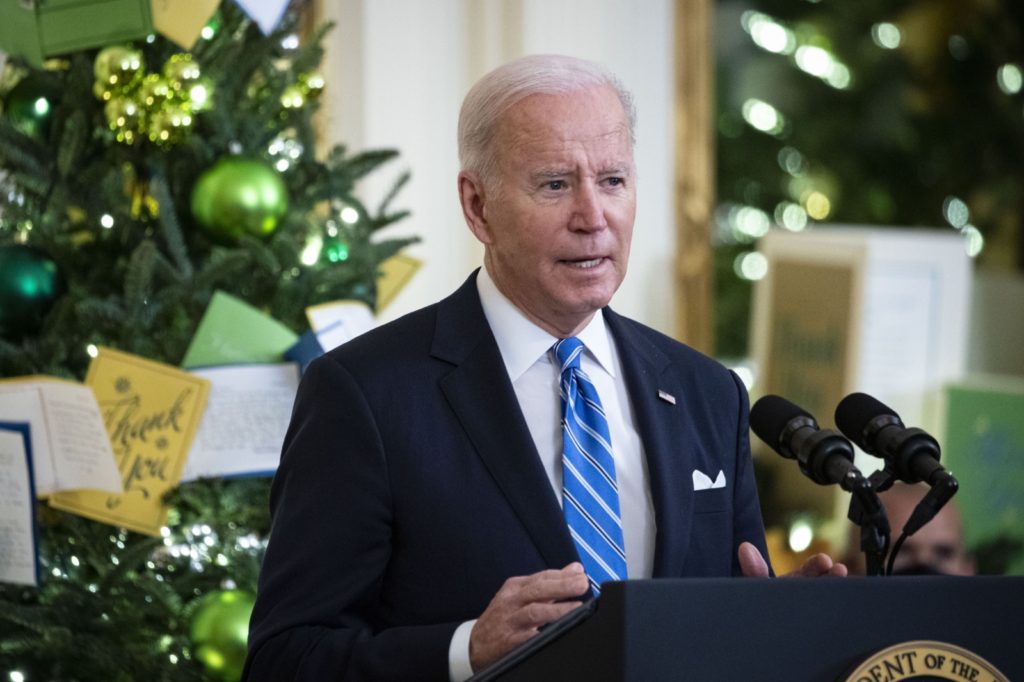Biden admits Build Back Better likely to be put off to 2022

President Joe Biden acknowledged that his $2 trillion economic proposal likely would not clear Congress this year, meaning that 2021 ends without a major accomplishment on social and climate policy.
The president, in a statement released Thursday evening, expressed confidence that the measure would eventually pass and urged patience as negotiations continue with Senator Joe Manchin, a West Virginia Democrat who has raised objections to the package.
“My team and I are having ongoing discussions with Senator Manchin; that work will continue next week,” Biden said in the statement. “It takes time to finalize these agreements, prepare the legislative changes, and finish all the parliamentary and procedural steps needed to enable a Senate vote.”
“We will advance this work together over the days and weeks ahead,” he added.
Biden’s statement came as Senate Democrats punted their plans to debate the Build Back Better bill into January after it became clear that there was no easy way to get them to 50 votes in the evenly divided chamber before lawmakers leave Washington for the Christmas recess.
House Democrats passed their version of the bill last month but, after months of talks, Manchin remains a key holdout for Democrats.
The delay denies Biden a major year-end victory that his allies hoped would bolster his sagging poll numbers and show voters that Democrats, with control of the White House and both chambers of Congress, can deliver for Americans.
Biden and the Democrats can, however, highlight the $1.9 trillion coronavirus relief package and the $550 billion infrastructure law as evidence they’re making good on their campaign promises as the 2022 midterm election season approaches.
Yet the failure of Biden’s signature economic plan to pass this year is just the latest and starkest reminder of the limits Democrats face with their narrow Senate majority that includes a few members who are more conservative than much of the party.
Other priorities that Biden and congressional candidates campaigned on in 2020, including gun control and overhauls of the policing and immigration systems, proved elusive during his first year in office. Senate Democrats are still seeking to pass voting rights legislation, though that remains a long shot.

Al Drago/Bloomberg
The economic bill hit a wall this week as Manchin negotiated directly with Biden but made little progress, people familiar with the negotiations have said. The bill calls for five years of spending and tax increases that would contribute $112.5 billion in deficit reduction, according to the Congressional Budget Office. Manchin, though, is concerned that it would commit the federal government to even more years of spending that will contribute to the deficit.
Manchin said Wednesday that one of his objections is a one-year extension of a Child Tax Credit. He said in an interview with CNN that it hides the true cost of the bill and that it should be extended for 10 years, if at all. But that would soak up most of the $1.75 trillion maximum he’s set for social and climate policy spending legislation and require many other provisions to be dropped or drastically modified.
As the talks with Manchin stalled, Biden and Schumer tried to pivot to trying to pass the John Lewis Voting Rights Advancement Act and the Freedom to Vote Act before the end of the year. But Manchin and Arizona Democrat Kyrsten Sinema have so far refused to sign onto a plan to change the 60-vote filibuster rule required to pass it.
Sinema met Wednesday with Democrats to discuss the possible rule change and appeared to come away unconvinced. She supports the 60-vote threshold “to protect the country from repeated radical reversals in federal policy which would cement uncertainty, deepen divisions, and further erode Americans’ confidence in our government,” said her spokesman, John LaBombard. Sinema also wants a public debate over the potential modification to Senate procedure.


